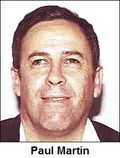Hamas extended the detention of British journalist Paul Martin by 15 days.
Unfortunate news, but hardly suprising. Hamas is waging a war on press freedom, to the point of dictating throwaway lines.
What is surprising is the media's silence on the affair. Martin's not a high-profile personality like Alan Johnston. But you'd think the UK news services that have used Martin's work over the years — particularly the BBC — would be more vociferous.
Tom Gross points out:
Paul Martin, who formerly lived in Cairo, has worked for a number of media over the years, including BBC TV and radio. Indeed he was last in Gaza six weeks ago on assignment for the BBC, and yet the almost complete silence of the BBC now on his fate is deafening. Contrast this to the near hourly mentions, day after day, week after week, by the BBC of their former Gaza correspondent Alan Johnston while he was held in Gaza in 2007.
One suspects that the BBC’s concern for Johnston was that he was “a BBC man through and through” (which included, naturally, demonstrating a deep sympathy for the Palestinian cause in his broadcasts) whereas Paul Martin, who now only works on a freelance basis for the BBC, has at least made some attempts to be critical of Hamas as well as of Israel. (When Johnston was released, he noticeably avoided thanking the government of Israel, who had tried to help in all kinds of ways to secure his release, but instead called Hamas leader Khaled Meshaal in Damascus to personally thank him. See last item here and other items on Johnston here.)
You'd also think the Jerusalem-based Foreign Press Association would be hawkish over Martin's safety and the woeful state of press freedom in Gaza.
But the FPA has issued just one statement. Chairman Conny Mus is dealing with more important issues: Israel's new citizen diplomacy campaign.
Read the rest of Gross's dispatch.
Related reading: 3 Important Differences Between Paul Martin and Alan Johnston


